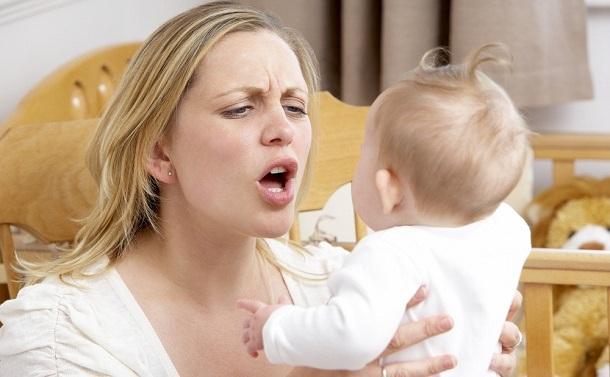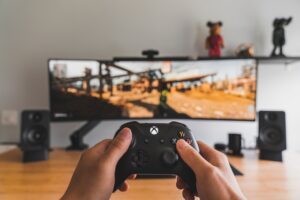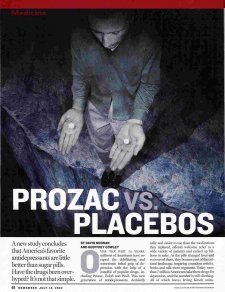New figures show the rate of antidepressants being prescribed over the past four years is at an all-time high and there's a huge disparity between ethnic groups.

Many countries like Australia and New Zealand have developed a strong liking for pharmaceutical drugs to the point where we are placing one in ten on an antidepressant. In NZ, we advertise them on TV and we market them aggressively on the internet. One of the biggest swindles is happening daily in your doctor’s surgery – the needless prescribing of antidepressants on a daily basis.
What do you think of the new sign to go up on Auckland’s motorway next week? Please read: Antidepressants no better than placebo (fake pills).
Look at these two real scenarios from our practice as an example:
Case study – Mrs. Doreen Jones, 49yrs.
Doreen is 49, is exhausted and burned out. She is raising three teenagers single-handedly after her partner walked out years ago. She studies part-time, works part-time and has to contend with the housework as well. Is it any wonder she is burned-out? Sleeping problems have become common place as she worries about how all the bills will ever be paid. Doreen feels tired, unhappy and fat because she has been skipping meals and eating too late in the evening.
She visits her doctor for a solution: “Doctor, I am tired, not feeling well or sleeping well” After 5 minutes the doctor says: – “Mrs. Jones, is is really quite simple – you have “depression”, take this pill (for the rest of your life) you will feel better”.
The real problem with Doreen is adrenal fatigue, not depression, doctor. This poor woman has worked her fingers to the bone for over twenty years and exhibits just about every sign and symptom of adrenal exhaustion. We have seen over 1,000 Doreens in our clinic in the past several years.
I asked her to discontinue her Prozac, and her GP’s input she successfully quit. We have had a great outcome with Doreen, after spending time with her to make changes to her lifestyle and diet, as well as treating her adrenal fatigue.
A mother brings her 14yr old son to the doctor – “Doctor, Johnny has been very naughty lately, he talks back, shouts and both my husband and me and is exhibiting “strange” behaviours”. Doctor: – “Mrs. Jones, I have the solution, an anti-psychotic drug. Your son will be good as new in a few weeks. Oh, by the way, he will need to remain on this drug for several years”.
 Did the doctor know that Johnny has been playing on Xbox for 4 hours every day, shooting up bad guys on an R18 game? Did he know that Johnny gets about 3 hours less sleep than a boy his age did in the 1960’s? Did the doctor enquire into Johnny’s diet and find out that he hates vegetables and eats chicken nuggets, drinks energy drinks and rarely ventures outside to play? Johnny does not need this drug, he needs a healthy diet and lifestyle, doctor.
Did the doctor know that Johnny has been playing on Xbox for 4 hours every day, shooting up bad guys on an R18 game? Did he know that Johnny gets about 3 hours less sleep than a boy his age did in the 1960’s? Did the doctor enquire into Johnny’s diet and find out that he hates vegetables and eats chicken nuggets, drinks energy drinks and rarely ventures outside to play? Johnny does not need this drug, he needs a healthy diet and lifestyle, doctor.
Johnny improved significantly after I spent time with his mother and urged her to put some boundaries into place for him. The Xbox was to be limited, the diet had to be improved and mum had to spend more time with him instead of being on Facebook herself every evening as was the case. Problem solved – Johnny is no longer on antipsychotics. He is much happier today, another child rescued from a drug prescription.
Did you know that an incredible 10 percent of New Zealanders took medication for mental illness last year, including an increasing number of people on antipsychotics, prompting a call for a major overhaul of a drugs-based approach to mental health?
Last year 1.2 million antidepressant prescriptions were issued for nearly 400,000 individual users, according to a TV3 News report. Antidepressant prescriptions today (2022) are at an all time high.
Pharmac figures showed that in 2007 64,500 people were using antipsychotics — commonly prescribed for severe mental illness, such as schizophrenia — but that grew to more than 80,000 last year. The youngest was two and the oldest over 100.
But advocates say drugs should be the last resort and the best approach for most is therapy. Mental health advocate Clive Plucknett, who heads the Challenge Trust, said drugs could be the easy option especially when many were only seen by experts for a 15 minute consultation.
He cited the example of an Indian man who was prescribed powerful drugs after appearing depressed as well as aggressive around meal time. “After we spent a day with this man, we discovered he had a tragedy in his life, he couldn’t speak English and it was against his religion to eat meat, so he got agitated.” Mr Plucknett described the situation as “frightening” as drugs were fine for a short period, “but when people start to use them, they tend to be on them for the rest of their lives”.
The figures for children using anti-psychotic drugs were also a concern, experts said.
Last year more than 700 of 10 to 14-year-olds were prescribed antipsychotics, nearly 300, between the age of five and nine and 22 under the age of four. How stupid is that. Child and adolescent psychologist Hugh Clarkson said prescribing such drugs to young people would have to be a last resort.
“You’re dealing with is a developing brain and the long term effects of giving these drugs to younger and younger children really isn’t understood.”
Antidepressants are NO better than placebo
 A 2002 study concluded that antidepressants are little better than sugar pills.
A 2002 study concluded that antidepressants are little better than sugar pills.
The July 15, 2002 Newsweek magazine reports that a new study by University of Connecticut psychologist Irving Kirsch titled “The Emperor’s New Drugs” has found that supposedly antidepressant drugs “may have no meaningful pharmacological effect at all.” The article says “Anti-drug zealots have said that for years, but Kirsch is a scientist, and he has data to back his assertion.” By pooling data from 38 studies on six supposedly antidepressant drugs approved by the U.S. Food & Drug Administration (FDA), Kirsch found “that people who got placebos fared almost as well as those getting real drugs.” Specifically, he found that on the 50 point Hamilton Depression Scale, people getting real drugs improved 10 points, versus 8 points for people getting placebos. The drugs he studied were Prozac, Zoloft, Paxil, Serzone, Celexa, and Effexor. The article quotes clinical psychologist David Antonuccio of the University of Nevada School of Medicine, saying: “One day we may look back and marvel at the stroke of marketing genius that led to calling these medications antidepressants in the first place.”
The article doesn’t say so, but if someone were to compare so-called antidepressants with a pill that has effects patients can feel physically, such as dizziness, but which also has been proved to have no antidepressant effect (perhaps by giving it to people in a study and telling them it is an antibiotic), the slightly better result from supposedly antidepressant drugs could probably be eliminated, since the neurotoxic “side-effects” of the real drugs convince people the drug they are taking is really doing something. In fact, people taking the real drug would probably do worse than those taking pills with side-effects but no antidepressant effect because of the real drugs’ neurotoxicity.
Reference: (David Noonan and Geoffrey Cowley, “Prozac vs. Placebos,” Newsweek, July 15, 2002, pages 48-49)